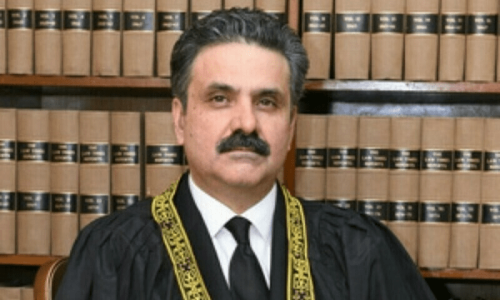BANGKOK: Thailand on Tuesday declared a 60-day state of emergency in Bangkok and surrounding areas to tackle mass street protests aimed at overthrowing the government.
The move follows weeks of rallies that have paralysed parts of the capital and sparked several bouts of deadly violence, including grenade attacks and shootings.
“The cabinet decided to invoke the emergency decree to take care of the situation and to enforce the law,” said Deputy Prime Minister Surapong Tovichakchaikul, noting that protesters had prevented officials from going to work.
The decree will come into force from Wednesday.
Prime Minister Yingluck Shinawatra is under intense pressure from demonstrators, backed by the royalist establishment, to step down after more than two months of street protests aimed at ousting her government and installing an unelected “people's council”.
It was not immediately clear how the government would implement the decree, which enables authorities to ban public gatherings of more than five people and detain suspects for 30 days without charge.
Labour Minister Chalerm Yubamrung, who will oversee its implementation, said Thailand would abide by international standards.
“We will not use force. We have no policy to disperse them (the protesters) and we haven't announced a curfew yet,” he said.
National Security Council chief Paradorn Pattanatabut said there were already enough police and soldiers deployed to deal with the demonstrations.
He said the decree could be used to ban protest marches.
Yingluck has called an election for Feb 2 but the main opposition party is boycotting the vote. The protesters are trying to disrupt the polls and have prevented candidates from registering in some southern constituencies.
The demonstrators have staged a self-styled “shutdown” of Bangkok since Jan 13, erecting roadblocks and rally stages at several main intersections, although their number has steadily fallen since the middle of last week.
Dozens of people were wounded and one killed in grenade attacks by unknown assailants on opposition rallies on Friday and Sunday.
The incidents, which each side has blamed on the other, heightened fears of growing unrest before next month's election.
The kingdom has been periodically rocked by political bloodshed since Prime Minister Thaksin Shinawatra, Yingluck's older brother, was overthrown by royalist generals in a coup seven years ago.
The latest protests were triggered by a failed amnesty bill that could have allowed Thaksin to return without going to jail for a past corruption conviction.
The demonstrators accuse the billionaire telecoms tycoon-turned-politician of controlling his sister's government from his base in Dubai.
Thaksin has strong electoral support in northern Thailand, but he is reviled by many southerners, Bangkok's middle class and members of the royalist establishment.
The emergency decree was imposed in Bangkok in 2010 when two months of mass rallies by the pro-Thaksin Red Shirts sparked violence that left more than 90 people dead and nearly 1,900 injured, ending in a bloody army crackdown.
The military, traditionally a staunch supporter of the anti-Thaksin establishment, has shown signs of reluctance to play a significant role in handling the current protests, saying it wants to remain neutral.
But the army chief has also refused to rule out another coup.













































